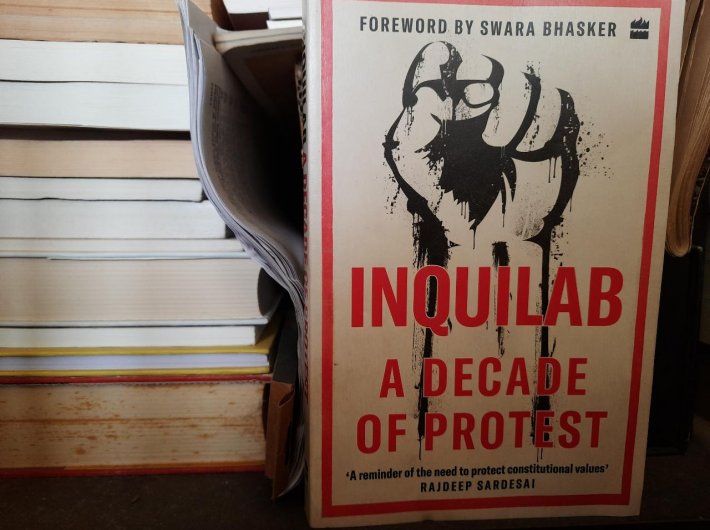An anthology of protest speeches, open letters and more, ‘Inquilab’ is a cultural document, with a lasting value
Inquilab: A Decade of Protest
Foreword by Swara Bhasker
HarperCollins India, lviii+206 pages, Rs 399
On April 5, 2011, some newspapers carried a single-column report about a Gandhian rural-development activist joining a protest movement to press for a Jan Lokpal bill. Many newspapers did not find it newsworthy. That was the time when the UPA government was facing popular anger as one after another allegation of corruption hit headlines. There had been numerous protest rallies that year – indeed, there was one less than a month earlier. They all had failed to make a mark.
The next day, however, all newspapers and other news outlets had to start giving more and more coverage to Anna Hazare’s fast unto death and the protest movement under the banner of the India Against Corruption (IAC). It’s not clear what made it click – TV coverage, the advent of social media, or plain frustration at mis-governance, but the ‘Anna Andolan’ brought respectable, middle-class folks on the streets, with candles in hand. Citizens rediscovered the art of protest, after a long while. Commentators drew similarities with even Jayaprakash Narayan’s Boat Club rally.
There had been protests and popular political movement between 1975 and 2011, but none was so widespread and most were limited to a particular section of society. And people liked speaking up, marching up, jumping over the barricades, cocking a snook at police. The decade since the IAC movement has seen people – of various classes – hitting the street with regularity on a wide variety of issues. The latest, just before the coronavirus herded everybody indoors, was the protest against the Citizenship Amendment Act and the proposed National Register of Citizens, from mid-December to February.
The performance of protest was usually accompanied some form of text – a memorable speech by a charismatic figure, an open letter, petition, signature campaign. In putting some of them together between its covers, ‘Inquilab: A Decade of Protest’ (published last month by HarperCollins India) offers us a cultural document, with a lasting value.
Young, articulate, passionate and fearless like the typical protester of this decade, Swara Bhasker is almost the ideal choice to pen the foreword – a long essay supplemented by a detailed chronology. Protests are of course as old as politics itself, and after an overview of its history and philosophy, she makes a crucial observation. “Until recently, protest was seen in the Socratic tradition – as a virtue, raising one’s voice against evil or injustice. However, the last decade in India has seen a sharp shift in the dominant discourse around protest,” Bhasker writes. The current trend, as it were, began with marches and rallies against a Congress-led government, but “the Congress didn’t criminalize protest in discourse or delegitimize protest in the public imagination in the manner that the Modi-led BJP government has.”
Yet, those believing in the idea of India will continue to draw inspiration from the many voices in this admirable anthology: JNU student leader Kanhaiya Kumar’s scintillating speech after release from jail, Chandra Shekhar Azad’s speech after his dramatic appearance at the Jama Masjid and Kavita Krishnan’s impassioned voice are balanced by Romila Thapar’s masterclass on nationalism, Ramachandra Guha’s tutorial on pluralism and Nayantara Sehgal’s cri de cœur in an open letter. Not to mention P Sainath, Mohua Mitra and many others, with Nabiya Khan’s poetry (reproduced here in Devanagari script along with translation) and Rohith Vemula’s last words revealing the potency as well as limitations of language in protest.
An indispensable reading for our times.
